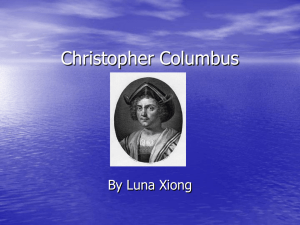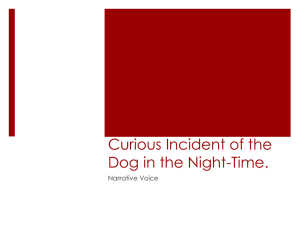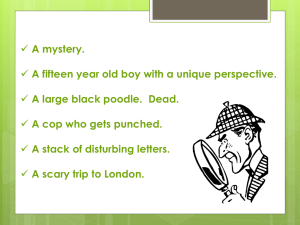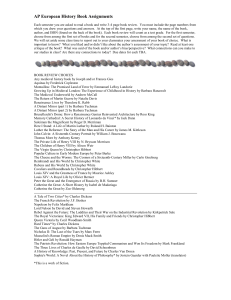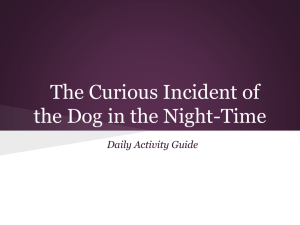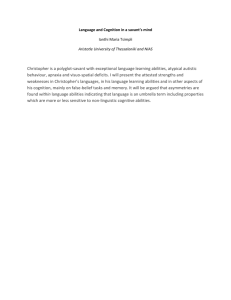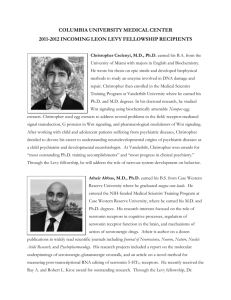Tribute to Christopher Evans What about the New Testament? To
advertisement
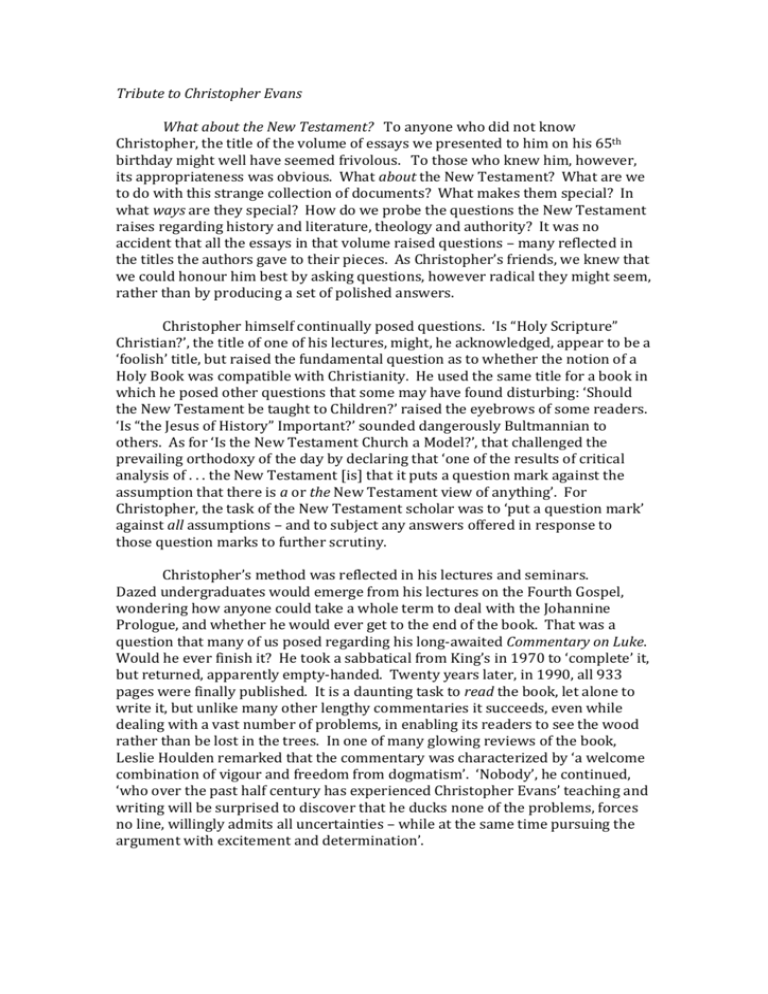
Tribute to Christopher Evans What about the New Testament? To anyone who did not know Christopher, the title of the volume of essays we presented to him on his 65th birthday might well have seemed frivolous. To those who knew him, however, its appropriateness was obvious. What about the New Testament? What are we to do with this strange collection of documents? What makes them special? In what ways are they special? How do we probe the questions the New Testament raises regarding history and literature, theology and authority? It was no accident that all the essays in that volume raised questions – many reflected in the titles the authors gave to their pieces. As Christopher’s friends, we knew that we could honour him best by asking questions, however radical they might seem, rather than by producing a set of polished answers. Christopher himself continually posed questions. ‘Is “Holy Scripture” Christian?’, the title of one of his lectures, might, he acknowledged, appear to be a ‘foolish’ title, but raised the fundamental question as to whether the notion of a Holy Book was compatible with Christianity. He used the same title for a book in which he posed other questions that some may have found disturbing: ‘Should the New Testament be taught to Children?’ raised the eyebrows of some readers. ‘Is “the Jesus of History” Important?’ sounded dangerously Bultmannian to others. As for ‘Is the New Testament Church a Model?’, that challenged the prevailing orthodoxy of the day by declaring that ‘one of the results of critical analysis of . . . the New Testament [is] that it puts a question mark against the assumption that there is a or the New Testament view of anything’. For Christopher, the task of the New Testament scholar was to ‘put a question mark’ against all assumptions – and to subject any answers offered in response to those question marks to further scrutiny. Christopher’s method was reflected in his lectures and seminars. Dazed undergraduates would emerge from his lectures on the Fourth Gospel, wondering how anyone could take a whole term to deal with the Johannine Prologue, and whether he would ever get to the end of the book. That was a question that many of us posed regarding his long-awaited Commentary on Luke. Would he ever finish it? He took a sabbatical from King’s in 1970 to ‘complete’ it, but returned, apparently empty-handed. Twenty years later, in 1990, all 933 pages were finally published. It is a daunting task to read the book, let alone to write it, but unlike many other lengthy commentaries it succeeds, even while dealing with a vast number of problems, in enabling its readers to see the wood rather than be lost in the trees. In one of many glowing reviews of the book, Leslie Houlden remarked that the commentary was characterized by ‘a welcome combination of vigour and freedom from dogmatism’. ‘Nobody’, he continued, ‘who over the past half century has experienced Christopher Evans’ teaching and writing will be surprised to discover that he ducks none of the problems, forces no line, willingly admits all uncertainties – while at the same time pursuing the argument with excitement and determination’. Excitement and determination characterized Christopher’s contributions to the joint seminar for undergraduates specializing in biblical studies which he and I ran together in the 60’s. Sitting on the edge of his seat, he would expound one or other of the New Testament passages we had chosen for in-depth study, introducing the students to critical analysis of the text. One week he would lead the discussion, the next it would be my turn – and though he was ever ready to ask questions, he was not necessarily prepared to accept the answers I offered him. ‘Rubbish!’ he would splutter when he disagreed. The students loved to watch us locked in dispute, and we certainly enjoyed our shared explorations. Our sessions were not, however, designed as entertainment, but rather to serve as demonstrations of the problems involved in any serious engagement with the text. There was always more than one way of approaching the problems, always more than one possible solution answer to any question. As Graham Stanton, his successor in the chair at King’s expressed it, Christopher ‘was a master teacher who had the knack of encouraging students to think about the text for themselves’. Christopher himself had studied Theology at Corpus Christi College, Cambridge, where, as he put it, he ‘had had the great good fortune to find himself a pupil of Sir Edwyn Hoskyns’, who influenced many Cambridge undergraduates of that pre-war era. Summing up what he felt he had learned from Hoskyns, he listed three things in particular. The first was the importance of the critical method. Hoskyns’ pupils, remarks Christopher, ‘had their noses rubbed in [the critical method], and were not allowed to talk theology apart from it’. For Christopher, the critical method was always the essential starting point. The second insight was the importance of Christology – not as ‘a subject in itself and on its own’, but as an aspect of theology and of the doctrine of God. Christopher himself explored this theme in an essay on ‘Christology and Theology’, where, writing on Paul, he commented ‘It would . . . be quite inadequate to Paul’s thought to say that as a Christian he had added to a previous satisfactory belief in God a belief in Jesus as the Messiah; rather had belief in Jesus as Messiah brought to light for the first time what belief in God really was, and had made it operative’. The third insight he attributed to Hoskyns was that although theology was ‘very properly pursued as an academic discipline in the universities, [it] was in the last resort a function of the church, and sooner or later the theologian must show himself responsible to the man and woman in the pew, and if possible to the man and woman in the street’. This fundamental answerability of the theologian to the church characterized Christopher’s approach. In some University departments, concerned as they were to prove that theology was a proper ‘academic’ study, and regarded any kind of belief as unscholarly, he would have been lost. In the King’s of the 1960’s and 1970’s, where more than 90% of the students were preparing for ordination, he was in his element, and in his teaching he demonstrated the relevance of academic study to personal faith. As Leslie Houlden expressed it in his review of Saint Luke, ‘This commentary . . . will not yield good sermons to the press of a button, but . . . it may prevent bad ones’ from being written. Christopher Evans was that all too-rare animal, the genuine ‘humble scholar’. He neither sought nor expected praise or honour, though he cherished them when they came his way. When Colin Hickling and I, writing the preface to the Festschrift, were attempting to sum him up, we hit on the word ‘serendipity’ which, according to the dictionary we consulted, means a gift for ‘finding valuable or agreeable things not sought for’. That gift was demonstrated in good measure when we came to present the book to him on his 65th birthday. Dennis Nineham, in his after-dinner speech, explained that we, his friends, had decided to mark the occasion by presenting him with a book. Christopher commented afterwards that he had sat there, wondering which book we had decided to buy for him. It did not occur to him that we might have written the book ourselves. He could not believe that he deserved such an accolade. I first met Christopher in January 1959, when he moved to Durham as Lightfoot Professor and, since I inhabited a large bed sitting-room above his study, quite incidentally became my landlord. In the following year he delivered his inaugural lecture, ‘Queen or Cinderella’, and presented me with a copy. Inside, I found the inscription: ‘To the real theologian who lives above the study’. Needless to say, that comment was as absurd as it was generous, but it seems to me that it demonstrates Christopher’s own insecurity. He could never quite believe that he was a real scholar, worthy of being appointed to a chair, or of being elected to the British Academy. And in part that was because, typically of pre-war students, he had never studied for a PhD, never ‘done research’. How, he wondered, could he dare to pontificate on scholarly matters when the Germans were so thorough in all their studies, and when he was increasingly surrounded by young British scholars who all needed to undertake postgraduate research if they were to become University teachers. Yet precisely because he did not pontificate, but continued to question all assumptions, it was he who was in truth ‘the real theologian’. There was of course far more to Christopher than the scholar and churchman. One of the things that endeared him to others was that he enjoyed life – and his enjoyment was infectious. It is true that there were bleak years for him after Elna’s death, and at the end of his life he found the limitations of old age frustrating, but he never lost his immense capacity for friendship. He enjoyed good food and wine and conversation, and lit up any gathering by his presence. The Christopher we remember is the Christopher with a smile on his lips and a twinkle in his eye. We thank God, both for the legacy of his writings, and for the privilege of having known him.
